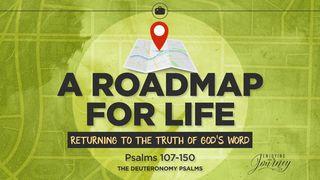Wildflowers: Lydia the AsterSample

Sensing the Spirit's Leading
Asters are the stars of the autumn garden making them the great late bloomers. Some call them the heroes of the fall. When all the other flowers begin to fade, they take center stage. Their name comes from the ancient Greek word that means star, referring to the shape of the flower head. Lydia stars as the first convert in Europe on Paul's second missionary journey, making her a latecomer to Christianity. In heroic fashion, however, her salvation was contagious as she championed the gospel throughout Philippi.
In Acts 15, we see Paul embarking on his second missionary journey with the goal to "go back and visit our brethren in every city where we have preached the word of the Lord, and see how they are doing" (v. 36). Assisting him on the journey was Silas before Timothy joined them on their first stop. The trio journeyed through multiple cities as "the churches were strengthened in the faith" (Acts 16:5).
That's when the Holy Spirit interrupted their plans with a couple of no gos. They had come from the southeast and longed to head southwest to Asia, but "they were forbidden by the Holy Spirit" (v. 6). Then they set their hearts toward Bithynia in the north when "the Spirit did not permit them" (v. 7). That left just one direction—true west. During the night, Paul had a vision of a man from Macedonia (you guessed it, in the west) beckoning them for help.
For Paul, God's nos were as important as His gos. The Holy Spirit is in control of the stops and starts of our lives and we should be just as thankful when He throws us a roadblock. He may have something better for us down a path we've never traveled before. What is stunning is that although God revealed a man from Macedonia in Paul's vision, Paul meets a group of women by the river in Philippi—Lydia, in particular. It turns out that the "man of Macedonia" (v. 9) was probably a woman! Although she was a late bloomer discovered on Paul's second missionary journey, she was perfectly placed in God's timetable of events. God had plans for Lydia, Philippi, and this particular region of Macedonia.
This region had strategic value. Alexander the Great longed to rule this region to fulfill his dream to conquer the east and west to create a one world rule. But God had a greater plan than Alexander. He planned to make the world one in Christ with the gospel from this tactical vantage point. Paul's vision would see that plan realized.
Read the verses below and answer the following questions:
"Now when they had gone through Phrygia and the region of Galatia, they were forbidden by the Holy Spirit to preach the word in Asia. After they had come to Mysia, they tried to go into Bithynia, but the Spirit did not permit them. So passing by Mysia, they came down to Troas. And a vision appeared to Paul in the night. A man of Macedonia stood and pleaded with him, saying, 'Come over to Macedonia and help us'" (Acts 16:6-9).
Practical Observation
1. Previous texts revealed that the travelers included Paul, Silas, and Timothy. According to verse 6, where had they been and where did they hope to travel?
2. Explain what they had hoped to achieve in these places.
3. Describe the work of the Holy Spirit in their pursuit.
Preach the word means to preach the gospel. Gospel literally means good news. Jesus came to the world to forgive those who believe that He is the Son of God who died and rose again to pay the penalty for our sins. Paul said, "I have made it my aim to preach the gospel, not where Christ was named" (Romans 15:20).
4. According to verse 7, where did they go next, and then where did they proceed?
5. Explain how the Holy Spirit responded to this second leg of the journey.
The Holy Spirit is the third person of the Trinity. He comes to convict the world of sin and draw people to Jesus. He also helps believers learn to walk with Christ. He is known as the Helper, from the Greek word paraclete, who stays with God's people between Christ's ascension and return.
6. What experience did Paul have in Troas? How do you think it impacted the apostle?
Macedonia is a mountainous country to the north of Greece. Its first mention in the Bible is found in Acts 16. It was ruled by the Persians, the Greeks, the Romans, and the Ottomans. It became a modern country again in 1991.
Personal Application
a. Describe a time in your life when the Holy Spirit said no to you. How did it make you feel? What lessons did you know learn?
Sometimes His delays are not His denials. Paul eventually went to Asia. Perhaps atgf this time their hearts were not ready for God's Word. "This continued for twotytt years, so that all who dwelt in Asia heard the word of the Lord Jesus, both Jews and ygvgGreeks" (Acts 19:10).
b. Have you ever had a vision? If you have, describe the experience. If not, list some ways the Holy Spirit has led you in the past.
A Vision is one of the supernatural ways God speaks to His people. Dreams happen at night while visions are given while a person is awake. People in both the Old and New Testament experienced visions. Usually, they were God's way of giving guidance or direction.
c. Has God provided people to join you on your Christian journey? Who are they? Describe a time they helped you make a decision.
About this Plan

In this four-part devotional, Lenya Heitzig pairs women of the New Testament with the wildflowers they represent. Like the star-shaped aster, Lydia spreads beauty and grace throughout her community. Lydia the Aster, is a five-day reading plan about a savvy businesswoman who didn't shy away from publicly proclaiming her faith.
More
Related plans

Fruit of the Spirit Christmas Plan

The Desire for Control

A Road Map for Life | Returning to the Truth of God's Word

Get Your Life Back: Everyday Practices for a World Gone Mad by John Eldredge

Raising Money-Wise Kids: A Parent's Guide to Biblical Money Values

Navigating Challenges in Christian Friendships and Relationships

John 3:16 - for God So Loved the World

Blessed to Be a Blessing

A Year in Luke/Acts
